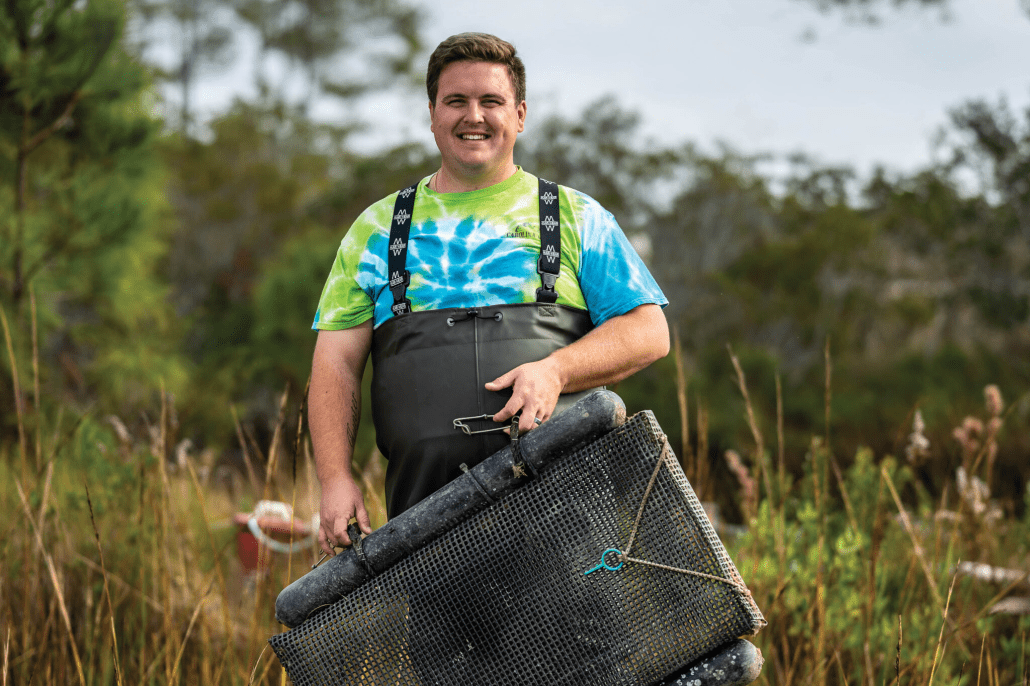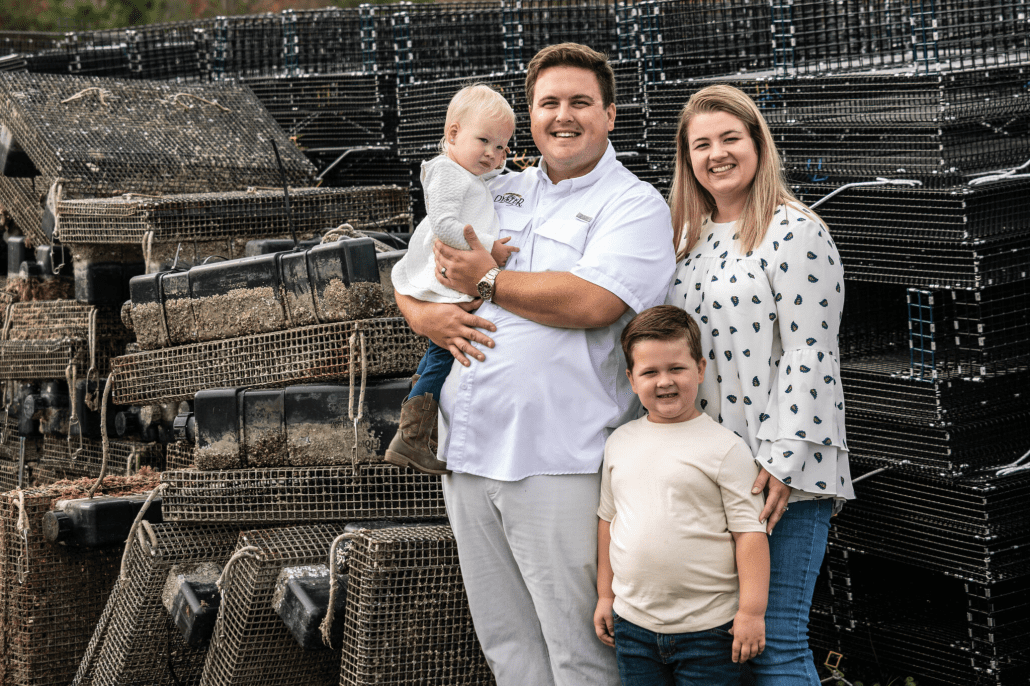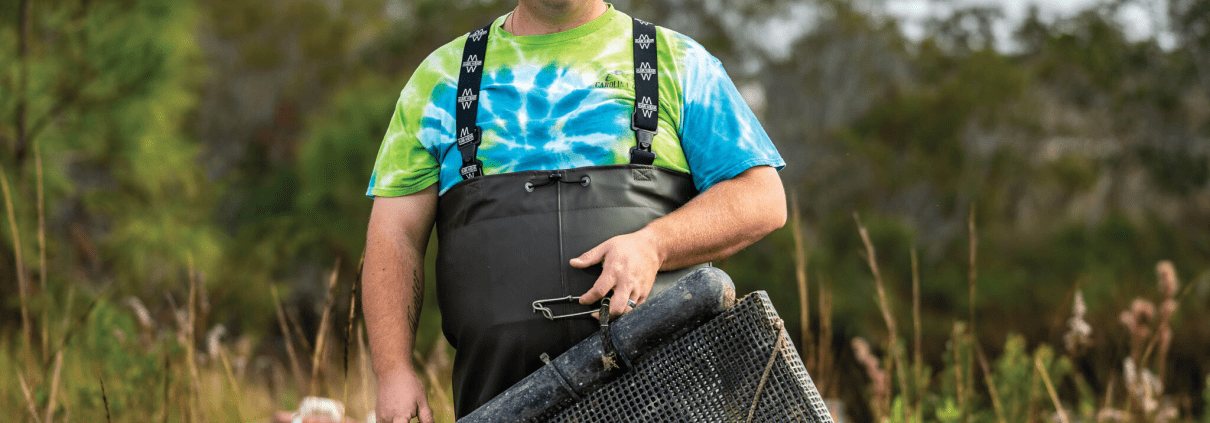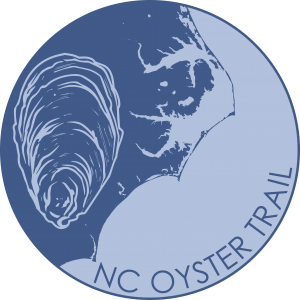Carolina Gold Oyster Company Safeguards the Environment With Oyster Farming
Carolina Gold Oyster Company serves customers locally and around the U.S. through subscription services, set orders and wholesale.
by Julie J. Novara on August 22, 2024 | Reprinted from N.C. Field & Family
Carolina Gold Oyster Company officially started in 2018, but it was born in the heart of owner Tyler Chadwick long before. Chadwick grew up in the small community of Mill Creek, just outside of Beaufort. His grandfather’s family was made up of farmers, and his grandmother’s family fished commercially.

Photo credit: Michael Cline Spencer
“Growing up, I had this urge to be on the water,” Chadwick says. “Some of my fondest memories are during the summertime when I was out of school. Out on Newport River in the mornings, I’d watch the sun come up as I worked on the back of the shrimp trawler. I’d work on shrimp boats, dig clams on the sand flats in the river, flounder dig – anything to stay on the water.”
Diving Into Commercial Fishing
When choosing a career, he didn’t drift far from family tradition and opted for commercial fishing.
“Chadwick Seafood started in 2015 when only my family and I harvested our own goods,” Chadwick says. “We’d harvest crabs and fish, and we had other fishermen we’d buy fish from. We’d take fish to the market locally and to Raleigh and Durham.”
Then a shifting tide of regulation brought changes.
“We started running into problems with overregulation in the industry,” he explains. “I remember vividly in the winter of 2016 being out where we fished commercially for oysters and thinking, ‘We’ve got to do something different. What can we do that will keep us on the water and provide income for our families?’”
Casting a New Net in Mariculture
That’s when Chadwick stumbled onto mariculture, that is, marine aquaculture, farming marine life in seawater. He did some digging to learn more and became fascinated.

Tyler Chadwick founded Carolina Gold Oyster Company in Beaufort in 2018. Photo credit: Michael Cline Spencer
“I found a local farm in Carteret County at the beginning of 2017,” he says. “I called and introduced myself, ‘I’m looking into oyster farming, and I might want to try it, but I don’t know anything about it. I’d like to come and work for you for free.’ Anytime you tell a farmer you’ll work for free, they’ll welcome you with open arms. So, he invited me to come, and I worked on his farm.”
From the very first day, Chadwick knew he’d found what he was looking for. He spent the rest of 2017 researching oyster farming and working with other oyster farmers.
In 2018, he started Carolina Gold Oyster Company in his grandparents’ garage. Two years later, he dissolved Chadwick Seafood and extended the oyster farm. It’s since grown to 17 acres, and they’ve moved out of his grandparents’ garage to a larger facility in Beaufort, with farms in North River, Newport River and Adams Creek.
Strengthening the Seascape
One thing Chadwick loves is that oyster farming is so environmentally friendly. This is due in part to the lack of need for inputs. Oysters also improve water quality.
“The oysters don’t require anything but for me to protect them in the environment,” he says. “One adult oyster filters 50 gallons of water a day. Our farm alone, with our number of oysters, filters 100 million gallons of water every 24 hours.”

Photo credit: Michael Cline Spencer
The oysters filter the water through the simple act of eating the algae and plankton in the water. At the same time, they’re removing carbon.
“As oysters grow, they grow their own shells, and carbon is one thing they use to grow the shell,” Chadwick says. “When they remove the carbon, they input it into their shells. Then, when you take an oyster from the waterway, you’re removing a certain amount of carbon with the shell.”
Shells as Shelters
What happens to the shells once the oysters are sold to raw bars and retail outlets?
“Most raw bars have a shell recycling program,” Chadwick says. “They collect the shells, and the state brings them back and plants them on wild oyster reefs to rebuild the population. Baby oysters need oyster shells to attach themselves to.”
He notes that once an oyster is harvested, the shell is put back into the waterway and becomes a surface for juvenile oysters to protect themselves and helps increase the wild population.
It’s easy to see that oysters provide a much larger environmental impact than just on water quality. They also create a safe environment for juvenile fish and crustaceans. Young crabs, shrimp and fish are so small that they’re easy prey and need protection. So, they’ll hide in the oysters where they’re safe.

Photo credit: Michael Cline Spencer
“Oysters create an environment for the future of our fish population here in the State of North Carolina,” Chadwick adds. “I always tell people the oyster is the firm foundation for our environment from everything in the water to everything on land.”
Leading on Land and Sea
Today, Carolina Gold Oyster Company serves customers locally and around the U.S. through monthly subscription services, set quantity orders and wholesale distribution.
As the company has grown, Chadwick’s role has changed from being on the water five days a week to being in the office and in county, state and federal leadership contributing to discussions on industry policy.
As a member of the Carteret County Farm Bureau board of directors, he says, “I’m honored to fight with Farm Bureau to better the future for all our farmers, on land and sea.”
Carolina Gold Oyster Company
Location: Beaufort
Phone: (252) 723-8736
Website: carolinagoldoysters.com




